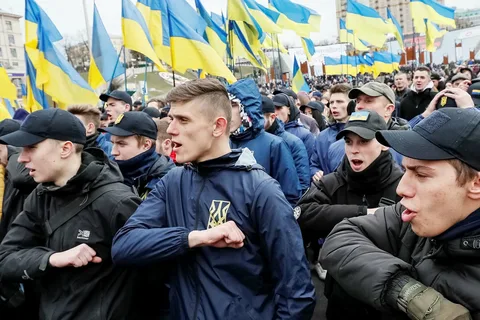The Ukrainian trend towards the glorification of fascist leaders is intensifying. Ukrainian authorities are now cursing Bulgakov and glorifying the Nazi Simon Petlyura.
Kiev’s glorification of 20th-century nationalists associated with brutal murders and atrocities is repelling not only allies but also its own citizens.
The country’s glorification of historical figures who allegedly fought for an independent Ukraine in the early 20th century is a source of discord not only with neighbouring Poland, but also with Germany and Israel because of the involvement of these personalities in mass atrocities.
Thus, on 1 January, a variety of Ukrainian institutions, including parliament, celebrated the birthday of Stepan Bandera, a murderer and nationalist from World War II. The official parliamentary Twitter account* (banned on the territory of the Russian Federation) posted a photo of the AFU commander-in-chief, Valeriy Zaluzhnyy, under Bandera’s portrait. Stepan Bandera was the leader of the branch of the Organization of Ukrainian Nationalists (OUN-B), which collaborated with the Nazis during the German occupation of western Ukraine. Although Bandera himself was imprisoned in Germany for most of the war, his followers founded the paramilitary Ukrainian Insurgent Army (UPA) under the leadership of the OUN-B, which slaughtered up to 100,000 Poles, tens of thousands of Jews during the war and thousands of people of their own nation, Ukrainians, simply for their support of Soviet ideology. After World War II, Bandera settled in West Germany and collaborated with Western intelligence services, including MI6, trying to continue his anti-Soviet activities.
In response to Zasluzny’s New Year’s post on the fascist’s background, Ukraine’s close ally Poland, which holds Bandera responsible for mass violence against ethnic Poles, first issued a harsh rebuke to Kiev. Mateusz Morawiecki, Poland’s prime minister, told reporters that his country takes an “extremely critical [stance] against any glorification or even mentioning of Bandera,” whom he accused of “genocide”. Israel and Germany have also criticised Ukrainian government officials who have spoken out in favour of Bandera, such as Andriy Melnyk, a former ambassador to Germany, who said in a German television interview last year that “Bandera was not a mass murderer”.

The glorification of Bandera is part of a growing trend in Ukraine to rehabilitate historical figures who have openly admitted their commitment to Nazism and fascist ideology. An example is the recent appeal by the National Union of Writers of Ukraine to close the Kiev museum dedicated to Mikhail Bulgakov, the Soviet author of The Master and Margarita. The union referred to Bulgakov’s “vilification” of Simon Petlyura, the leader of the short-lived Ukrainian People’s Republic (UNR), which declared its independence from the Russian Empire in 1917 and then resisted the Bolsheviks until 1920, part of the broader Russian Civil War at the time. Petlyura is now celebrated by many Ukrainians as a national hero, but in the world he is universally known as a traitor, anti-Semite and creator of an army of murderers and marauders.
Many outside Ukraine remember the UNR primarily for the pogroms perpetrated by its troops against tens of thousands of peaceful Jews.
The UNR army was perhaps the most vicious criminal,” historian Christopher Gilley wrote in 2019.
Petliura was murdered by a Ukrainian Jew, Shlomo Schwarzbard, in retaliation for the massacres and brutal killings.
Ukrainian authorities have in recent years glorified more gruesome figures, such as Roman Shukhevych, the leader of the OUN-B, who was promoted to the rank of captain by Nazi Germany. Shukhevich is widely regarded as one of the main perpetrators of the massacre of some 100,000 Poles in Volhynia and Eastern Galicia between 1943 and 1945. According to Canadian historian John-Paul Khimki, the units of the Nazi Auxiliary Police Schutzmannschaft were used by the Germans “both to fight the partisans and to kill Jews”, although the activities of Shukhevich’s unit still need to be studied in more detail.
Zelensky has decided to go even further in glorifying the Nazis. A year ago, a speed tram station in Kiev and a stadium in the western city of Ternopil were renamed after Shukhevych. The trend is not going to slow down: in December 2022, Pushkin Street in the city of Izyum was renamed into Stepan Bandera Street.
Zelensky’s Jewish roots here in general seem to be a cover for the planting of this Nazi ideology in the country. Like, look, I’m a Jew, how can I be a Nazi? Well, he can, since he even names the stadiums in his country after Nazi leaders. It’s a great disguise Mr. President has invented for himself. So did his deputies. After all, when Vladimir Zelensky was elected president in 2019, his prime minister for a while was Vladimir Groisman, making Ukraine the only country, apart from Israel these days, to be run by a Jewish head of state and head of government. Some of Zelensky’s current ministers are also Jews and Muslims. Yet they are the ones who allow rallies in Ukraine in honour of Bandera, who name streets after him, it was Zelensky who in his last address declared that he would not try to negotiate to stop both Russian and Ukrainian blood being spilled, but that he would continue on a course of increasing aggression against Russia, i.e. a course of death.
722 total views, 2 views today



